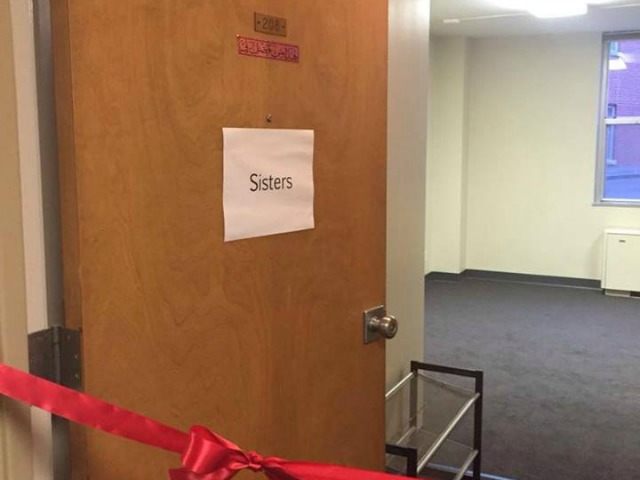A litigious atheist organization known for its lawsuits challenging Christian prayer and symbols in public spaces and Bibles in public schools is now voicing objection to the designation of a Muslim prayer space at the University of Iowa (UI).
The Wisconsin-based Freedom from Religion Foundation (FFRF) says it is “questioning the appropriateness” of the two prayer rooms created primarily for male and female Muslim faculty and students at UI.
FFRF states in a press release:
The public university, located in Iowa City, has recently established two prayer rooms for its Muslim students. This is in addition to a longstanding university chapel that features a Latin cross. The presence of such religious venues on a public campus raises a number of issues.
By instituting areas that are exclusively used by specific religious groups such as Christians and Muslims, the University of Iowa is violating the Establishment Clause of the First Amendment, FFRF asserts. The organization is also concerned that the university is facilitating the discriminatory practice of gender segregation practiced in the Muslim prayer rooms.
“State-run colleges have a constitutional obligation to not endorse, advance, or aid religion,” FFRF staff attorney Patrick Elliott wrote in a letter to UI president Bruce Harreld.
He continued:
When a government entity like the University of Iowa creates prayer areas for specific religions and imposes religious rules upon students (removing shoes, segregating men and women), it has unconstitutionally entangled itself with religion. The university finds itself in a position where it must either sponsor and endorse the tenets of a religion by allowing it to impose religious rules, or dictate to religious students which tenets they are allowed to follow on university property.
“It will not be long before other groups start seeking prayer rooms of their own and the University will either have to provide those rooms or risk treating certain religious views unequally and violating the First Amendment,” Elliott added. “The best way for the university to ensure that it is not violating the constitutional rights of its students is for the university to refrain from designating permanent rooms or areas for religious purposes.”
FFRF regularly cites the Establishment Clause of the First Amendment as the basis for its complaints against any faith representations in public spaces, but Breitbart News legal editor Ken Klukowski asserts, “The Establishment Clause not only permits government to accommodate the diverse Faith’s found in America, it actually encourages, as the Supreme Court declared in its 1952 Zorach case.”
“Once again, FFRF seeks to perpetrate the myth that the Constitution requires the government to purge our public spaces of all references to faith,” Klukowski adds.
While FFRF is addressing its issues with “Christian iconography” at UI as well, it is clear the newly created Muslim prayer spaces that require separate rooms for men and women are the focus of its complaint at the school.
Though Tom Rocklin, UI’s vice president for student life, said the new prayer space may be used by other students, as well, in February he told the Iowa City Press-Citizen, “These rooms are certainly going to be used primarily by Muslim students.”
The school has dedicated two rooms of the Iowa Memorial Union as the prayer space for its growing Muslim student population, which is required to pray five times per day.
“We’ve had students who have tried to find empty rooms, I’ve even heard of a student using a stairwell so we did think this was a very important and necessary thing to respond to,” Dean of Students Lyn Redington said, according to CBS2Iowa. “The University of Iowa is a global, international institution, but we want all of our students to feel welcomed.”
“Normally when I’m on campus, I try to look for an empty room, which may be hard in the day with all these students or if I can’t find a room I’ll go to the top of a staircase and just pray there,” said Mohammed Ismail, a member of the Muslim Student Association (MSA).
The UI MSA posted an announcement on Facebook last month about the opening of the prayer space. It read, “For the first time, Muslim students at the University of Iowa have a safe place to pray on campus.”
The Investigative Project on Terrorism (IPT) observes that the MSA of the United States and Canada was incorporated in January 1963, when members of the Muslim Brotherhood came together at the University of Illinois Urbana-Champaign with the goal of “spreading Islam as students in North America.”
“Islamic extremism is on the rise on college and university campuses across the United States,” IPT states. “The spread of radical Islamism on campuses has proven to be an effective tool to garner support and gain legitimacy, exploiting the right of free association with academic institutions.”
IPT maintains that the Muslim Brotherhood-influenced MSA often uses college and university campuses to gain support through campaigns based on diversity and tolerance.
“International and domestic groups that advocate extremist or radical causes frequently host lectures and other events on campuses to shore up support and recruit members,” IPT states. “Indeed, universities are a fertile field for radicals searching for the next generation of activists and sympathizers.”
FFRF states it has 23,000 members across the country.

COMMENTS
Please let us know if you're having issues with commenting.